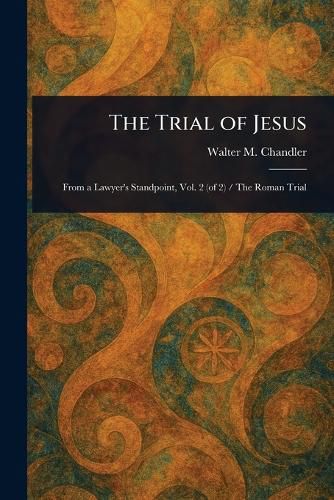Readings Newsletter
Become a Readings Member to make your shopping experience even easier.
Sign in or sign up for free!
You’re not far away from qualifying for FREE standard shipping within Australia
You’ve qualified for FREE standard shipping within Australia
The cart is loading…






This title is printed to order. This book may have been self-published. If so, we cannot guarantee the quality of the content. In the main most books will have gone through the editing process however some may not. We therefore suggest that you be aware of this before ordering this book. If in doubt check either the author or publisher’s details as we are unable to accept any returns unless they are faulty. Please contact us if you have any questions.
Explore the legal and historical complexities surrounding one of history's most pivotal events in Walter M. Chandler's "Trial of Jesus from a Lawyer's Standpoint, Vol. II (of II): The Roman Trial." This meticulously researched volume delves into the Roman legal proceedings against Jesus Christ in Jerusalem, focusing on Pontius Pilate's role and the application of Roman law.
Chandler, writing from a lawyer's perspective, examines the trial through the lens of legal history, offering insights into the charges, evidence, and judgment. This detailed account provides a unique perspective on the events leading to the crucifixion, making it essential reading for those interested in the intersection of religion, law, and ancient history. A classic study of the subject, this book will appeal to those studying Jesus, the New Testament, and the history of Roman legal practices.
This work has been selected by scholars as being culturally important, and is part of the knowledge base of civilization as we know it.
This work is in the public domain in the United States of America, and possibly other nations. Within the United States, you may freely copy and distribute this work, as no entity (individual or corporate) has a copyright on the body of the work.
Scholars believe, and we concur, that this work is important enough to be preserved, reproduced, and made generally available to the public. We appreciate your support of the preservation process, and thank you for being an important part of keeping this knowledge alive and relevant.
$9.00 standard shipping within Australia
FREE standard shipping within Australia for orders over $100.00
Express & International shipping calculated at checkout
Stock availability can be subject to change without notice. We recommend calling the shop or contacting our online team to check availability of low stock items. Please see our Shopping Online page for more details.
This title is printed to order. This book may have been self-published. If so, we cannot guarantee the quality of the content. In the main most books will have gone through the editing process however some may not. We therefore suggest that you be aware of this before ordering this book. If in doubt check either the author or publisher’s details as we are unable to accept any returns unless they are faulty. Please contact us if you have any questions.
Explore the legal and historical complexities surrounding one of history's most pivotal events in Walter M. Chandler's "Trial of Jesus from a Lawyer's Standpoint, Vol. II (of II): The Roman Trial." This meticulously researched volume delves into the Roman legal proceedings against Jesus Christ in Jerusalem, focusing on Pontius Pilate's role and the application of Roman law.
Chandler, writing from a lawyer's perspective, examines the trial through the lens of legal history, offering insights into the charges, evidence, and judgment. This detailed account provides a unique perspective on the events leading to the crucifixion, making it essential reading for those interested in the intersection of religion, law, and ancient history. A classic study of the subject, this book will appeal to those studying Jesus, the New Testament, and the history of Roman legal practices.
This work has been selected by scholars as being culturally important, and is part of the knowledge base of civilization as we know it.
This work is in the public domain in the United States of America, and possibly other nations. Within the United States, you may freely copy and distribute this work, as no entity (individual or corporate) has a copyright on the body of the work.
Scholars believe, and we concur, that this work is important enough to be preserved, reproduced, and made generally available to the public. We appreciate your support of the preservation process, and thank you for being an important part of keeping this knowledge alive and relevant.